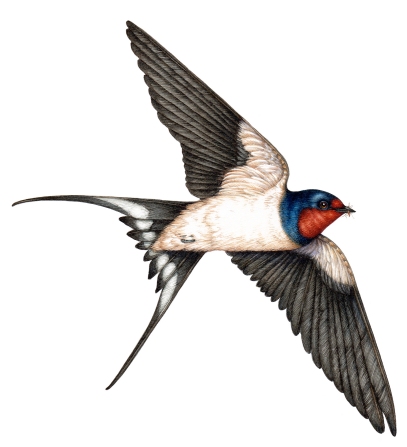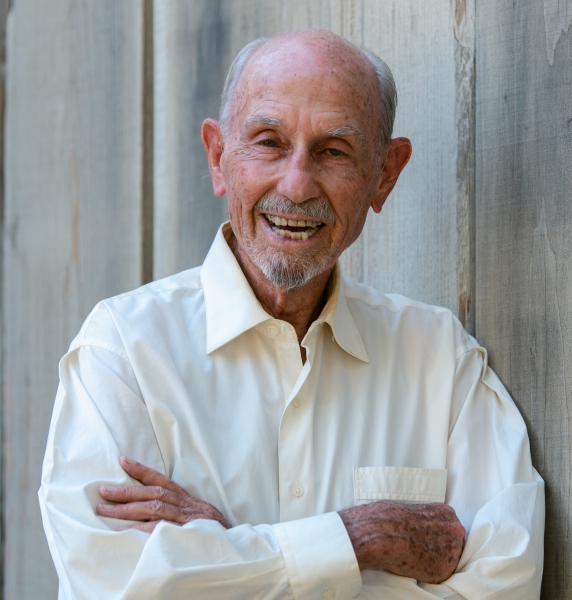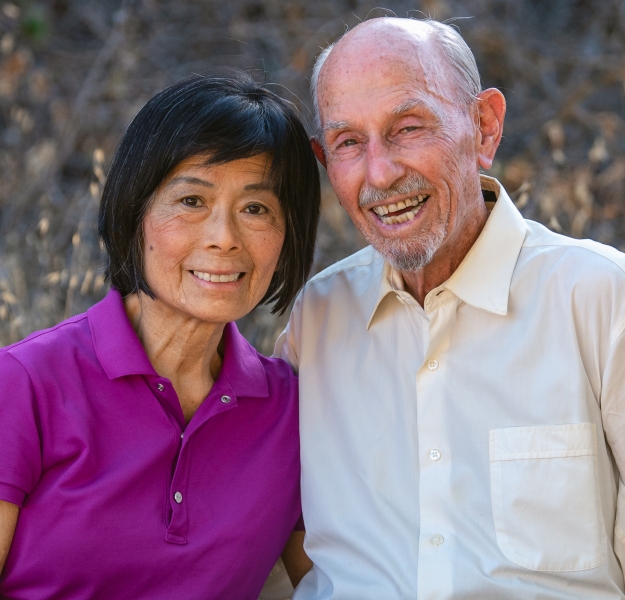
When the Swallows Come Back
by Ed Wilcox
I
A strong wind blowing dark grey clouds heralded a coming storm, destined to douse the timeworn shack. Inside on rough wood walls, shadows flickered from lighted candles, as the faint scent of incense made a weak attempt to cover up the musty smell. At a heavy, oak table, an octogenarian astrologer with white shoulder-length hair and a long white beard sat plotting his chart. 
Jeff asked, “Why do you need the date, time, and place of my birth?” 
“At that time and place, it is necessary to know how the sun, moon, and planets were positioned to help us understand significant issues about your character, personality, desires, and what can trigger future events.” His voice was deep, relaxed and calm. 
“Oh,” full of doubt, why was he here? Planets determine my behavior, absurd. 
“Saturn is in the third house, squares the sun conjuncting Mercury. Stress over trying to communicate with your father.” 
Thunder cracked and rolled, vibrating the walls and rattling windows. 
Jeff’s mind turned to San Marino, to his father’s estate, where after the servant brought the dark chocolate mousse, the finale to the gourmet dinner. It was time to go outside to the well-lit putting green. The seventy-year-old father inevitably out-putted his forty-year-old son, and would have to remark, “If you practiced more, you’d be more determined.”

The routine was to return to the den where chips and playing cards were on the table. His father and stepmother took the game of poker seriously and as they played, his father’s loud voice, extolling about his money-making ventures, annoyed Jeff, but he suppressed his anger. 
“Interesting. I had trouble with a domineering father. He was loud and bragged about his successes. We never connected.” 
“Why did you choose him?” 
“I didn’t. He chose me, he and my mother.” 
Jeff was taken aback by the astrologer’s inquiry, who looked at Jeff with a kindness, an empathy. 
“Mr. Wellborn, relax. Forget the skepticism. You are not required to believe or not to believe. Have an open mind, as together we want to find insights that will be of help to your sense of wellbeing. Many lifetimes you have been reborn on to this earth. Each time you were waiting in the astral world for the right parents, those who will give you an opportunity to use their influence to further you on the road to perfection. Of interest is what have you learned from your father.” 
“What have I learned? To avoid exploiting others, questions are more important than persuasion; humility takes you a lot further than pride.” 
Jeff, however, did succumb to the ways of his father, became an executive in the realm of high finance, living with his family in San Marino. 
The rain drummed down on the tin roof, inducing the astrologer to raise his voice.
“Your father’s influence, for better or worse, was consequential, as was your mother’s. Moon in the fourth house trining Jupiter, sextile Venus, Moon in Libra, spiritual, just, important to be fair, to be truthful, and sincere. Not likely to get along with your father.” 
“They didn’t—divorced when I was fourteen.” That was when Jeff and his younger sister left the upscale San Marino with their mother for San Juan Capistrano, where she was born into a family with deep roots. It was a little town with a mission, close to the ocean, a little town clinging to its pastoral past. His mother loved to walk along the water’s edge, breathe in the ocean air, watch the seagulls take off and land as breaking waves coasted up on the sand. Jeff quickly shed his San Marino imprint from the highly competitive, top-ranked high school to one more earthy and provincial, populated with Mexicans. The property with the adobe ranch house built in the 1800s was a five-acre remnant from his mother’s ancestors. A dramatic change occurred after school; rather than playing tennis, he went to the barn, saddled up the grey mare, and rode out over the rolling hills where vast herds of long-horned cattle once roamed, cattle owned by his mother’s great great grandfather, John Forester.

He was born in Liverpool in 1814, traveled to Mexico when he was sixteen, then on to California where he lived the rest of his life. He became the largest landowner in southern California. He joined the Catholic church and became a Mexican citizen when he was twenty-two, then a year later he married Pio Pico’s sister Ysidora. Her brother, the governor, helped Don Juan to begin acquiring land. In 1844, when he was thirty years old, he purchased the San Juan Capistrano Mission that had been left abandoned when Mexico secularized the missions and confiscated their lands. He paid $710 for it, converted the living quarters into a ranch house where he managed an extensive farming and cattle raising establishment. Cattle were raised for their hides, thousands of them. One clipper shipload bound for Boston would contain 40,000 hides. Don Juan Forster’s land extended over 212,000 acres, including parts of Orange County and San Diego County. Ysidora, six years older than her husband, a deeply religious lady, gave birth to six children; three lived. Their marriage lasted 45 years until Don Juan died. She lived one more year. 
Unlike her sister, Jeff’s mother failed to identify with her family’s legacy. Her older brother in Yreka, north of Mount Shasta in keeping with tradition, owned a large cattle ranch. Jeff spent his summers there roping, branding calves, chasing strays, rounding up cattle to be sold for slaughter, and mending fences. He got used to long hours of hard work, the dust, sweat, the smell of cattle, but what he enjoyed most was the challenge to his horse-riding skill. 
After school, he rode to his favorite place, an outcrop on top of a hill, tied the mare, sat down to take in the view of the little town below and out to the endless ocean. His breath slowed down, the interval of not breathing extended. A strange calmness was all-consuming before he slipped into a trance: Herding the long-horns, courageous horsemanship from the indigenous Juanenos was in full display as they roared by. Over the stilled landscape butchered cow meat lay to rot on the ground, for only the hides had value. 
His face reddens, disfigured with erysipelas, the disease that finally took its toll. Don Juan Forester a spent man, acquitted after killing two squatters, failing to bring settlers, selling land to pay for so much debt, welcomed death at sixty-eight. 
The train carrying the casket to Los Angeles was met with three-thousand mourners and after the service, the casket was placed in the Pio Pico Vault, his brother-in-law’s, the ex-governor. 
After graduation, Jeff, at his father’s willingness to pay for his education, went to USC, where his father and other Wellborns had attended. He moved back to San Marino, the place for the privileged, men of means, men making a difference. 
II

It was Henry Huntington living in a huge estate on a hill overlooking San Marino that set the standards. At the turn of the century, no one contributed more to the growth and prosperity of Los Angeles. The sprawling suburbs became populated after he linked them with his Pacific Electric Railway system with 1,300 miles of track, twenty distinct lines, and 1,250 separate trolleys. His wealth and influence were immense: he sat on over sixty boards, his Land and Improvement Company created sub-divisions, both commercial and industrial developments. He financed an airfield that brought aerospace to Southern California. He was instrumental in the founding of Caltech and the Los Angeles Chamber of Commerce.

His home on the hill was designed more as a museum than for a family, for after he died, it was to become open to the public. His wife’s wealth combined with his and became the means of a famous cultural collection: art, books, and gardens. He purchased books by the railroad carload, rare books from collectors, over 200,000 to become a source for a world renowned research library.

People recognized Henry by his cap and walrus mustache, a man who was rather shy, humble, and kept his distance. He lived Andrew Carnegie’s motto:

“Wealth is not to feed our egos but to feed the hungry and help people help themselves.” 
The blue-eyed, bouncy, blond cheerleader and socialite Betty Forsyth, impressed with Jeff, his background, his father, the estate in San Marino, targeted him for her husband. The marriage was a grand affair, a large crowd assembled at the Huntington Hotel for a formal reception. They moved into a home owned by Jeff’s father in San Marino as Jeff with the help of his father found a job at Capital Group. Betty engaged in supporting and organizing cultural activities, arts, music, and fund raising.

“Jeff, there is an event at the Huntington Library tomorrow night for John Baldassare, an introduction to his exhibit in the Boon Gallery. We need to be there early.” 
“Okay, I’ll be ready.” Jeff went along for the ride, but was given to drinking more than his share of scotch and sodas. 
As the years went by, in their 30s, then their 40s with kids off to college, Jeff’s mother watched her strong, rugged, horse-loving adventurer turn into a pudgy, over-weight executive, married to a pretentious socialite with spoiled children. She tried to warn him that his lifestyle was taking its toll, but to no avail. His will had diminished. He was along for the ride, while drinking too much. 
When his father died, they moved into the estate with the aging-step mother. With his inherited funds, Jeff joined a venture capital firm, resulting in a significant increase in their wealth, all to the delight of Betty as she was able to provide more for her philanthropy. 
Jeff, unlike the rest of the family, never forgot to stay in touch with his mother who refused to accept his money. 
“Jeff, I am quite comfortable, I don’t need much, and don’t want much. I feel so fortunate for my friendship with Marie and other neighbors, for the weather, for this wonderful place to live. Last night was a quiet, still, perfectly clear night. I sat out on the patio, looking up at the stars and out loud I said to myself, ‘Amazing, how great, how truly great.’” 
One month later, she suddenly succumbed to a heart attack. Jeff was devastated, drove to San Juan Capistrano to take solace in the mission church, but his recovery from the loss was wanting and he became distracted, spending time alone with his scotch and soda. Gary Powers, his friend from college, became concerned and confronted Jeff. 
“You don’t look so good and seem kind of out of it. And Jeff, you’re drinking too much. You are my friend and it hurts to see you like this.” 
“I know, Gary, I know. It is hard to explain, when my mother died, I began to realize how artificial, living so long in it. Mother tried to warn me. Gary, I don’t belong here in San Marino, I don’t belong here.” 
“Come on Jeff, you are going through a mid-life crisis. I am going to make an appointment for you with my wife’s astrologer. He really helped her get free of a funk that went on for some time.” 
“Transiting Saturn entering your seventh house is about to square Pluto putting an extreme strain on your marriage. Could be a separation, even a divorce.” Looking up from the chart with his inquiring eyes, the astrologer’s voice reflected empathy. 
“No, not in the cards, or chart, or whatever.” 
Two weeks later, returning from dinner at the Round Robin, with wine-supported courage, Betty said, “Jeff, I am not one to lead a double life, and there is another I am in love with. I am sorry, it just happened and with you and I, it is not working. I mean, how often in one’s lifetime do you fall in love?” 
Anger erupted in him as his heart began to pound, but he held back, took a deep breath. “Don’t worry about me. It feels like time for a divorce.” He let her out of the car then drove off to a neighborhood bar and phoned Gary Powers. Gary was there in fifteen minutes. 
“What is wrong, Jeff? What is the emergency?” 
“Well, your damn astrologer was right. We are separating, probably a divorce. Gary, it is not working, I don’t like my job, my kids are spoiled, and my wife is in love with somebody else.” 
“How can I help, Jeff. I am sorry.” 
“You are a lawyer and I want to transfer my holdings into a joint account with you. Give the estate to Betty. I don’t belong in San Marino. See if you can settle with her and the kids, but tell no one where I am. I am going back to my mother’s; the place is empty. I will do some soul searching and try to get my life turned around. Maybe this is the best thing that could happen to me.” 
Gary encouraged him and promised to take care of his holdings but advised not to give up on San Marino and its future opportunities for him. 
III 
He felt a sense of relief when he drove up the driveway, parked the car, unloaded his packed personal gear and clothes, and opened the doors and windows to get fresh air into the old adobe house with its thick walls, the house of good memories where he lived his teenage years. He had boiled water and was drinking tea when a familiar voice interrupted, “Oh, it is you, Jeff. I was just checking who was here.”

Maria Garcia was his mother’s close friend and neighbor, in her early eighties but still spry and energetic.

“Are you okay, Jeff? Pardon, but you don’t look so good.”

“Maria, so good of you to come. Sit down, I will pour you a cup of tea. I am coming home to stay awhile. I need to put my life back together; stop drinking, get exercise, good healthy food. The lifestyle in San Marino is just too much. My marriage is over. I quit my job. Only one friend knows where I am. I dropped out, ran away.”

She put her hand on his, “Jeff, Jeff, if your mother was still alive, she would be so happy that you came back. She used to say to me, ‘I wonder when my son will wake up.’”

Tears came as he said, “She tried to warn me, but I ignored her.”

“Jeff, I am so glad you have come to the right place to get better. We are here for you, Jeff. Our family is your family.”

He found solace at the beach, like his mother, barefoot, taking long walks on the wet sand, listening to the sound of the waves breaking-in, a hypnotic rhythm helped his mind gradually get free of its restless turbulence. After a short swim, he lay on the warm sand, enjoying the rays of the sun, the breeze from the sea, and he would drop off into sleep. In the afternoons, he relearned to use his hands, for the place was in need of repair, fences for the corral, stalls and loft in the barn, and a lot of clean up. His saddle, harnesses, blankets, and curry combs were still there where he left them thirty-five years before then. Still there, but covered with dust and spiderwebs.

As he was removing a bale of hay, Marie interrupted. Wiping the dust and sweat from his face, he sat down on the bale of hay to listen.

“I made tamales and left some on your table. Already you look better, lost weight, sun-tanned, getting your strength back. Are you going to get a horse?”

“When I found the saddle was still here, my memory of how much I used to enjoy horses kicked in. Maybe I should. Let me pay for the tamales.” He reached for his wallet.

“No, no, it is a gift, not a sale, please, Jeff, a gift. But I was wondering about my granddaughter, Juanita. She went back to school to study anthropology and could use money. If you are willing, she could do your housework, take care of your laundry, and prepare your meals. Her parents got into trouble and she came to live with me when she was ten. After high school, she went to City College, but ran short of money, then waited on tables for two years, saved enough to go back to school.”

That evening, Marie brought Juanita over, and Jeff was impressed. Juanita’s large black eyes sparkled; she was alert, inquisitive, and lighthearted. “Where do you keep the vacuum cleaner? Where is the broom closet? Cobwebs on the ceiling; no dishwasher. Laundromat on the back porch. No food in the refrigerator. Jeff, I can help. $100 per week and we have a deal.”

Jeff said “$100 dollars? No, I will settle for $150. I have an extra key, so you can do what needs to be done at whatever time works for you.”

Before moving back to San Marino, Jeff had gone to an Arabian horse show and became an ardent admirer of the breed with a thousand-year history dating back to the days of nomadic Bedouins. Arabians horses are easily trained, intelligent, gentle, people friendly, quite muscular, and esteemed for their versatility and endurance. He drove to San Demise for the Cal Poly campus where he stopped at the Kellogg Arabian Horse Center. After taking some time to decide, he selected a shining, black, four-year-old gelding. He paid $20,000 for it.

By the time they delivered the horse, Jeff had made the necessary preparations, buying straw for the stall, alfalfa hay, oats, and even a bunch of carrots. Back on the saddle again, he rode on those trails leading over the time-worn, cattle-grazed, rolling hills, the trails he grew fond of thirty-five years ago, trails from his ancestors.

In addition to horseback riding, Jeff joined a gym in San Clemente and hired a trainer. In a little over a year, since he returned to San Juan Capistrano, not only had he regained his strength and looked ten years younger, but he felt more centered, more himself, more of what he lost after he left for USC. His life settled into a routine; mornings at the beach, a long walk, a swim, followed by a sunbath; early afternoon manual work in the yard, barn, house repairs; and by three, he was horseback riding; in the evening, after the gym, he read books from his mother’s collection or would draw in his sketch book. Since he was quite young, his mother encouraged his drawing, but it went by the wayside when was in San Marino.

Juanita was there a lot when Jeff was away. She left notes, “Leave them, I can do the dishes, put the dirty laundry on the back porch. I left your dinner in the fridge. Is it okay if I use your place to study? Too many distractions at home.”

Returning from a workout at the gym, he found her at the dining room table with her lap-top computer, highly engaged.

“You want some tea? I will boil some water.”

“Yes, fine… I mean, is alright if I continue to work here?” 
“Of course, I will be in the living room.”

But it was Juanita who fixed the tea and brought a cup to where Jeff sat down to read. 
“Thank you. I guess I forgot about the tea. What are you studying?”

“My ancestors, the Acjachemen tribe that lived here for 8,000 years. What they did to enable such long-term survival.”

“The indigenous people living here before the mission period, those forced to become Catholics and work for the Mission?”

“Yes, my father was a full-blooded Acjachemen. They lived nearby along the San Juan Creek, about 300 in a village called Pauhe. The Acjachemen lived in small tribelets, 30 to 50 families throughout the region all the way to where Camp Pendleton is today.”

“Once you understand how they did it, their ability to sustain, then what?”

She smiled, shrugged her shoulders, “How long will our civilization last at the rate we are living with ever-increasing consumption, pollution, and global warming?”

“I’ve not paid enough attention to it. I should be more concerned.” 
That evening was the beginning of an unexpected relationship. 
IV

A week later when he returned from the morning at the beach, she was there with the opened lap-top, looked up, smiled, and said, “Oh, you are back. Am I in your way?”

“No, not at all. I am going to have lunch at a Chinese restaurant in San Clemente. Why don’t you join me?”

“Why not?”

She told him that she is a vegetarian.

“Why? What is wrong with eating meat?”

“You don’t know? Too much protein is toxic. Animal fat clogs the arteries, cattle create a huge amount of methane that is warming the planet, and animals that we humans eat transmit viruses that infect us.”

“You need protein to build tissue.”

“Yes, but not too much, especially from corn-fed, antibiotic-injected, feed-lot cows. Beans and rice are as good in producing protein as a steak.”

He laughed and said, “You convinced me; from here on I am with you, a vegetarian. So you have to order for us vegetarians seeing I am a novice.”

As they shared the eggplant, tofu, egg-fu-young, and fried rice, Jeff asked, “What about your ancestors’ sustainability… What have you learned?”

“Most writers on the subject will say it is about their way of living with nature, being an integral part, one with nature and not an exploiter; a distant, objective analytical response. But when I interviewed this very old lady of our tribe about it, she told me: “White people plow up the ground, pull up trees, kill everything. The tree says, ‘Don’t, it hurts.’ But they chop it down, cut it up. The spirit of the land hates them.”

“Come on, you don’t believe trees can talk.”

“I would gladly believe trees can talk if that belief helped me to verify it. Would I just hang out with the belief without concern for verification? Would I be a fanatic? Science has proven trees communicate with one another through intertwining roots, a mycorrhizal network. When I asked the chief of the Acjchemen if trees could talk, he said, “Yes they talk, but we don’t understand their language like the white man doesn’t understand ours.”

For two hours they talked; most of the time, Juanita explained as Jeff listened and asked questions. She described how they live harmoniously with nature, never taking without giving back, without showing their gratitude.

Driving back home, Jeff asked, “Did you get to know my mother?”

“Only casually. She and Grandmother were very close friends. Evening time on a bench together, they would sit in silence watching the sun go down and enjoy the gloaming, almost every day. When she heard about your mother’s death, my grandmother went into shock, stayed in her bedroom with the door shut for a day and a night. When she came out, her eyes were swollen and red.”

“It was a tipping point for me. Time to come back to San Juan Capistrano to get my act together.”

One week after their lunch date, while entering the barn in late afternoon, Jeff was intrigued to find Juanita there petting Sinbad, his head hanging out from the stall. 
“I didn’t know you liked horses. That is Sinbad, a four-year-old Arabian.” 
“This is the first time I touched a horse. He is friendly, likable, I guess.” 
“You have never been on a horse before?”

“Never.”

She watched him slip on the halter, throw the blanket over Sinbad’s back, then the saddle.

“Juanita, it is time for you to learn. Put your foot here in the stirrup, grab hold of the saddle horn, and swing your leg over… That is the way. Got your foot in the other stirrup, now in your left hand take hold of the reins.”

She was game, fearless, eager to learn.

“Sure you haven’t been on a horse before?”

“I told you, never.”

After he hooked a rope to the horse’s halter he stood in the middle of the corral as the shiny, black Sinbad with Juanita in the saddle walked around the perimeter of the corral.

“He is going to pick up the pace, move faster. Try to relax and let your body move with his. No air between you and the saddle.” As the horse loped into a canter, she stuck to the saddle even when he slowed to a trot.

“I can’t believe you haven’t been on a horse before.”

He took the rope off the halter and she quickly learned how to control the horse, even how to have him back up.

Juanita surprised herself, never dreamed how much fun it was, and how fast she became attracted to Sinbad. With her desire and Jeff’s encouragement, soon on her own, she was out back riding Sinbad over the ancient trails. 
V.

The swallows had returned. Summer approached, giving the two of them more time to spend together.

“You are never here in the morning time. Where do you go?”

“Tomorrow I will show you. Be prepared to get wet.”

With the sound of breaking waves, feeling the warmth of the morning sun, they walked for about a mile before Juanita said, “Walking gets boring. Let us run.”

She remembered he was in his fifties. However, as it turned out, she was struggling to keep up. After a short swim to cool down, they stretched out on the warm sand.

“You are in good shape, Jeff.”

“For an old guy,” he replied.

“Still, you are a little stiff. I will teach you yoga postures to loosen you up, making you more flexible.”

“I am ready.”

He changed his routine, spending one night at the gym, the next engaged in yoga postures with Juanita.

Her quickness was mitigated with a deep breathing exercise, as she cautioned Jeff not to strain like he was lifting weights, but to relax into the pose, a stretch like cats do, or when you wake up from sleeping. “Keep your ego out of it, don’t try to do it perfect if it is causing strain.” But she was able to do each posture perfectly and he was impressed with how easy it was for her to bend, twist, and stretch. After forty-five minutes, they lie flat on their mats in the corps pose, practicing deep relaxation for fifteen minutes. Then she taught him how to meditate. Gradually, Jeff’s entire demeanor changed, becoming calm, relaxed, poised, more sensitive, more empathetic.

During the shared calmness after meditating, Juanita took the risk to ask Jeff, “You lived in San Marino for more than thirty years, but you never talk about it. Why? Was it that bad?”

“I have nightmares that I am still there hating it, but tolerating it. With guests at our dinner table, with the social elite events, the museums, the concerts, the schools, even at the office I felt out of place and would continually think to myself ‘I don’t belong here.’ Because of that, my take on the people is tainted, critical, not objective. The conservative politics, the elitist society plagued with its restless pace, competitive ambiance, and pretentious discourse, took me down, becoming tolerable only with enough consumed alcohol. Whether it was about a rare bottle of wine, Jackson Pollock’s paint-thrown canvas, Philip Glass’s strange sounds called music, a Republican fund raiser, or the economist from Wells Fargo, it all felt quite sophisticated, shallow, and ostentatious. Even family conversations were contrived. Living with this cynicism took its toll, and that… that part of my past is best forgotten, not worthy of conversation.”

“Grandmother told me when she saw you when you first arrived that you looked very dark, beat up. But no more. You came back to where you belong to our way to live, free from what you went through. I am glad for you.”

“Okay, Juanita, it is your turn now. What happened to you with your parents?”

“I can barely remember my father. Mother, she was out of it, heroin. I was neglected and living in East L.A., wasn’t safe, and when Grandmother saw what was happening, she told my mother she would care for me because I was a mess, dirty clothes, uncombed hair, underfed, a skinny kid. So my grandmother became my mother and she treated me with care and love and there is nothing I wouldn’t do for her. We have a large family that supports one another and our matriarch is the glue that bonds us.”

When Jeff returned from his work-out at the gym, Juanita was at the table engaged in research and he went into the living room to read. His mother’s collection filled the bookshelves from where he found a 1913 edition of Rabindranath Tagore’s Sadhana. As the cover was frayed and the pages faded, he assumed his mother had prized it enough to return to it again and again. He wondered why and began to explore.

Who was Rabindranath Tagore? Famous, a Nobel prize winner for poetry, exceptionally productive, not only contributing in all forms of literature from essay to plays, but was a musician known throughout India for songs he composed. He traveled the world, lectured, founded a boy’s school and a university, and in his later years, took up painting. At work, still contributing until he died at 80 years of age. Jeff found out that Sadhana meant a discipline with the goal for achieving spiritual realization. The book was a compilation of Tagore’s lectures. In the first chapter titled “The Individual and the Universe,” he came across a passage that caused him to interrupt Juanita.

“Wait tell you hear this,” and he read, “A man who has his spiritual eyes open knows the truth about earth and water, a perception of the soul by the soul giving us joy which is the product of the union of kindred things. Water does not merely clean, but purifies the heart; for it touches the soul. Earth does not merely hold one’s body, but it gladdens the mind; its contact is more than physical – it’s a living presence.”

“According to Tagore, the Rishis, ancient sages dwelling in India’s forests were intimate with nature, not unlike your Acjachemen.” That was the spark that lit the fire inspiring their exploration of how humans and nature can coexist sustainably, exploring it both scientifically and intuitively.

One evening when he was at the gym, on the table, among newspapers, he left his sketchbook. Curious, she opened it to find soft-lead pencil drawings depicting time-defying images of San Juan Capistrano: A swallow’s head looking out from under a roof tile; gnarly trunks of age-old pepper trees; the mission’s roman arches and its garden fountain; a dirt path lined with knee-high rock walls leading into an eucalyptus grove; a large, timeworn prickly-pear cactus, behind a picket fence, and in front of an adobe-walled, tile-roofed house; a wall covered with bougainvillea and hibiscus flowers. It reminded Juanita of where, in her childhood days, she played hide and seek with neighborhood kids, played on sunny afternoons after school. The next page startled her and her heart jumped a beat as she stared at drawings of her, flattering sketches, causing her to wonder if he thought she was attractive, causing her face to feel flushed, her heart to feel warm and tender. She had to leave before he got back. 
VI 
Juanita was in the kitchen, cleaning the sink, when Jeff called from the back door, “Juanita come out here. There is something you need to see.”
Drying her hands on her apron, brushing her hair back, she followed him into the barn. Another horse in the stall next to Sinbad’s caught her eyes, a bay Arabian mare. 
“Where did she come from? She is beautiful.” 
“You will have to give her a name.” 
“Who? Why me?” 
“Because this horse belongs to you. She is yours.” 
“Mine? My own horse… oh Jeff, oh, my God.” 
“Now we can ride together. A lot more fun than just alone.” 
She was overwhelmed and with tears of joy, she threw her arms around him, giving him a big hug. 
In the late afternoons together, they rode over the pastoral grounds steeped in a historical past with reminding remnants. They frequented the trail along San Juan Creek with towering sycamore and oak trees as it traversed land that once was home for the Acjachemen. Also, it was favored for them to ride to the top of the hill, tie the horses, and sit on the outcrop to watch the sun slowly disappear into the ocean. 
“How did the meeting with your Acjackemen go last night?” he asked. 
“Sometimes it gets extreme. The elders challenged the 17- and 18-year-olds to undergo a severe test to prove they are brave. Have you ever been bitten by one of those big red ants?” 
“On the foot. The pain went all the way up my leg, as bad as a bee sting.” 
“So, where there is an ant hill, they dig it into a pit, ants scrambling all over and the 18-year-old is laid down into the pit for the ants to bite and to see if he can endure the pain without showing it hurts. When they get him up, ants are stuck to his bare body for the elders to remove by brushing them off with stinging nettles. If they pass the test, they are told that they would be impervious to arrows.” 
“How many volunteered?” 
“None” 
“The elders said our ancestors were disappointed.” 
Coming back from the beach, Jeff wondered whose new Maserati was in the driveway. Out in the barn checking out the horses, he found his old friend Gary Powers. 
“Jeff, is that you? What an improvement! You look ten years younger, tan, fit, relaxed. People in San Marino would not recognize you.” 
“You are being kind, Gary, but I am grateful that I have put my life back together again by living where I belong.” 
They drove in the new Maserati to the Chinese restaurant for lunch. Not only did Jeff explain how he turned his life around, his routine, the beach, manual work, horseback riding, the gym, yoga but when he said he was a vegetarian, that was a little too much for Gary. 
“Whatever, Jeff, it is working, that is for sure. If you hadn’t made the change you might not be alive today.” 
“Well, it was you, the astrologer, Betty, my mother’s death that finally woke me up. You didn’t drive all the way down just to say hello. What’s up?” 
“Well, first, I probably shouldn’t even bring it up, but I promised. Betty’s affair fizzled and she is willing to talk reconciliation, but unlike you, she is starting to age, not looking so good.” 
“Yeah, why once he has completed his sentence would a prisoner want to go back to prison?” 
“Okay! Enough of that. The other issue is that John Adams is retiring, which means you will be the major shareholder in a VC firm in need of leadership. The team wants you to come back.” 
“No way. That is flattering, but I am where I belong, but why don’t you run it, represent my interests. You have been a lawyer too long, time for a change.” 
“You are right. I am kind of stuck in a rut, doing the same old stuff.” 
They discussed the firm’s current portfolio, its exit strategy, and when it would be retired.
“Gary, we need to learn a lot more about the innovators in energy, its efficiency, and conservation about alternative energies, and carbon sequestration. If you want to lead the group in that direction, with my stamp of approval, be my guest.” 
“Very intriguing. Before I say yes, give me a week to think about it.” 
“Of course.” 
He was on his way to clean up the horse stalls when Marie stopped him. “Jeff, we need to talk.” 
“Sure, let us go inside where it is comfortable.” As they sat up to the dining room table, Marie’s demeanor was serious. She looked intently into Jeff’s eyes. 
“My grandson Pepe lost his job and I want him to stay at my place, but I am out of room.” 
Jeff thought is that all? Not as serious as she looked. 
“I have an extra room where he can stay, Marie, no problem.” 
“I have a better idea, Jeff. I want Pepe to move into Juanita’s room and she could move in with you. All she can talk about nowadays is you and the horses. She is in love with you and that can’t be just one way. You must have feelings, for her too.” 
“I have… yes, it is true. But I am too old. It is not fair to her.” 
“Nonsense! My husband was 20 years older than me and I wouldn’t have wanted it otherwise. Age is about resisting change. Jeff, look, both of you have never been happier. Why not take advantage of how you both feel?” 
Speechless, he looked puzzled, and finally said, “Does she know about what you are up to?” 
“Not yet, but all she will ask is it all right for Jeff?” 
“Tell her I more than welcome it.” 
“Fine, I will say you have an extra bedroom she can move into.” 
As Marie opened the backdoor to leave, she looked up in the sky at the flock of birds circulating the mission, and said, “They are right on time, the swallows, back for the summer.” 
Jeff helped Juanita move her things into the extra bedroom, her clothes in the closet, and fill the chest of drawers. But the made-up bed stayed made-up, void of a sleeper. 






















